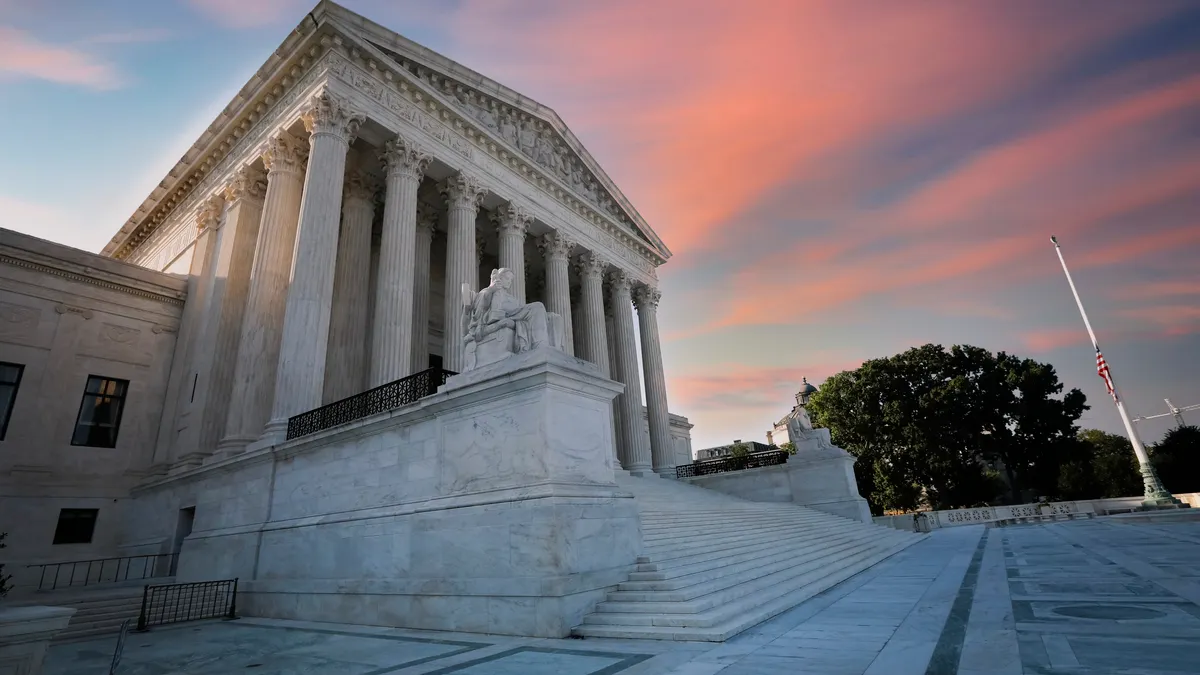Allowing President Donald Trump to fire Federal Reserve Gov. Lisa Cook “would sound the death knell for the central-bank independence that has helped make the United States’ economy the strongest in the world,” the embattled economist’s attorneys warned the Supreme Court in a brief Thursday.
Lawyers for Trump and Cook have argued to three courts now over whether the president showed sufficient “cause” to fire the Fed governor.
“The President offers a boundless interpretation of ‘for cause’ that is scarcely distinguishable from ‘at will,’” Cook’s lawyers wrote Thursday. “Accepting that interpretation here would eviscerate the Federal Reserve’s longstanding independence, upend financial markets, and create a blueprint for future presidents to direct monetary policy based on their political agendas and election calendars.”
Cook’s lawyers Thursday cited the Supreme Court’s May decision to shield the Fed from an order upholding Trump’s firing of officials at the National Labor Relations Board and the Merit Systems Protection Board.
“The President now requests that the Court precipitously depart from that view and allow him to remove [Cook] … without process based on flimsy, unproven allegations of pre-office wrongdoing — allegations conveniently timed following the President’s criticism of the Board’s policy decisions,” Cook’s lawyers wrote. “Granting that relief would dramatically alter the status quo, ignore centuries of history, and transform the Federal Reserve into a body subservient to the President’s will.”
Trump announced last month he would dismiss Cook based on concerns that she may have committed fraud when she obtained mortgages for properties in Michigan and Georgia within weeks of one another, yet each was listed as a “principal residence” in paperwork – a designation that arguably could give the loans a more favorable interest rate.
Cook’s lawyers noted Thursday that on separate documents submitted for security clearance vetting and a loan estimate, the Georgia property was listed as “vacation home” and “2nd home.”
That is not “fraud,” “deceitful,” “potentially criminal” or “gross negligence,” Cook’s lawyers said, quoting the opposition’s claims.
“Because of the hasty nature of Governor Cook’s purported removal and the expedited litigation posture, neither the President (who is required to give Governor Cook an opportunity to defend herself) nor the lower courts have considered a full factual record,” Cook’s lawyers said Thursday. “When that record is compiled, it will demonstrate that Governor Cook never acted improperly with respect to her mortgages and thus will eliminate the President’s stated ground for his purported removal.”
Cook’s lawyers have contended the mortgage allegations were a front to fire the Fed governor because she historically – at least through her votes with the Federal Open Market Committee to set interest rates – disagreed with Trump’s vehement push to lower the rate.
Further, the flurry of court activity ahead of the FOMC’s last meeting – particularly a deadline Trump’s lawyers at the Justice Department requested for a decision from an appeals court – demonstrated that the aim appeared to be to prevent Cook from participating in the committee’s vote Sept. 16 and 17.
Yet, the DOJ waited until after the FOMC vote to petition the Supreme Court. That perhaps illustrated that the administration “understood the chaos” Cook’s firing could generate, the Fed governor’s lawyers wrote Thursday. It also contradicted the Trump team’s demand for “immediate relief,” Cook’s lawyers added.
The Cook brief came hours after several past Fed chairs and Treasury secretaries submitted to the court their own thoughts on the case.
Granting Trump’s request to allow Cook’s dismissal would “expose the Federal Reserve to political influences, thereby eroding public confidence in the Fed’s independence and jeopardizing the credibility and efficacy of U.S. monetary policy,” attorneys wrote in a friend-of-the-court brief signed off by former Fed chairs Janet Yellen, Ben Bernanke, Alan Greenspan and others.
Financial markets, employers and lenders “are watching the current dispute … to judge how credible the Fed will be going forward,” wrote the group, which also included recent Fed Gov. Daniel Tarullo, Obama-era treasury secretaries Jack Lew and Timothy Geithner, Clinton-era treasury secretaries Robert Rubin and Lawrence Summers, and George W. Bush-era Treasury Secretary Henry Paulson.
A group of 22 Republican state attorneys general, meanwhile, filed a friend-of-the court brief arguing the district court lacked the authority to halt Trump’s firing of Cook.
Not every filing split along party lines. Dozens of Republican former lawmakers and officials filed their own brief Thursday arguing that if the Supreme Court allows Cook’s firing, it would “threaten[] the separation of powers that defines our constitutional order.”
For that matter, the Cook brief indicates the Fed governor’s legal team has its own high-powered Republican attorney: Paul Clement, who served as solicitor general during the George W. Bush administration and has argued more than 100 cases before the Supreme Court.
Notably, in their brief Thursday, Cook’s lawyers cited a 2009 law review article in which now-Supreme Court Justice Brett Kavanaugh detailed protection the Fed receives from executive-branch control because of the central bank’s “power to directly affect the short-term functioning of the US economy.” Kavanaugh likely represents a crucial opinion in the Cook-Trump case.









